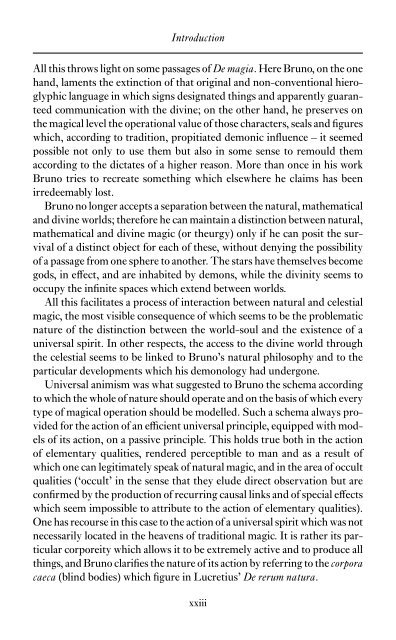You also want an ePaper? Increase the reach of your titles
YUMPU automatically turns print PDFs into web optimized ePapers that Google loves.
Introduction<br />
All this throws light on some passages of De magia. Here Bruno, on the one<br />
hand, laments the extinction of that original and non-conventional hieroglyphic<br />
language in which signs designated things and apparently guaranteed<br />
communication with the divine; on the other hand, he preserves on<br />
the magical level the operational value of those characters, seals and figures<br />
which, according to tradition, propitiated demonic influence – it seemed<br />
possible not only to use them but also in some sense to remould them<br />
according to the dictates of a higher reason. More than once in his work<br />
Bruno tries to recreate something which elsewhere he claims has been<br />
irredeemably lost.<br />
Bruno no longer accepts a separation between the natural, mathematical<br />
and divine worlds; therefore he can maintain a distinction between natural,<br />
mathematical and divine magic (or theurgy) only if he can posit the survival<br />
of a distinct object for each of these, without denying the possibility<br />
of a passage from one sphere to another. The stars have themselves become<br />
gods, in effect, and are inhabited by demons, while the divinity seems to<br />
occupy the infinite spaces which extend between worlds.<br />
All this facilitates a process of interaction between natural and celestial<br />
magic, the most visible consequence of which seems to be the problematic<br />
nature of the distinction between the world-soul and the existence of a<br />
universal spirit. In other respects, the access to the divine world through<br />
the celestial seems to be linked to Bruno’s natural philosophy and to the<br />
particular developments which his demonology had undergone.<br />
Universal animism was what suggested to Bruno the schema according<br />
to which the whole of nature should operate and on the basis of which every<br />
type of magical operation should be modelled. Such a schema always provided<br />
for the action of an efficient universal principle, equipped with models<br />
of its action, on a passive principle. This holds true both in the action<br />
of elementary qualities, rendered perceptible to man and as a result of<br />
which one can legitimately speak of natural magic, and in the area of occult<br />
qualities (‘occult’ in the sense that they elude direct observation but are<br />
confirmed by the production of recurring causal links and of special effects<br />
which seem impossible to attribute to the action of elementary qualities).<br />
One has recourse in this case to the action of a universal spirit which was not<br />
necessarily located in the heavens of traditional magic. It is rather its particular<br />
corporeity which allows it to be extremely active and to produce all<br />
things, and Bruno clarifies the nature of its action by referring to the corpora<br />
caeca (blind bodies) which figure in Lucretius’ De rerum natura.<br />
xxiii

















